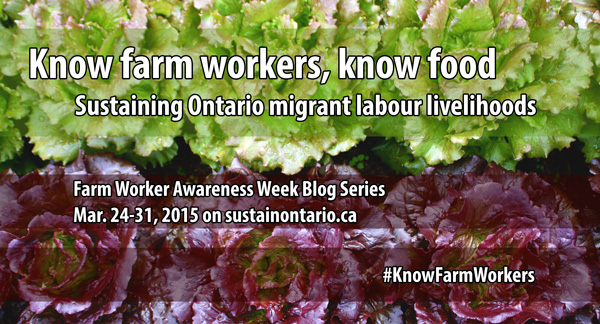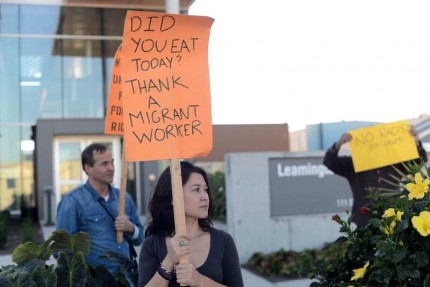Know farm workers, know food: A food justice and food sovereignty approach
Posted: March 28, 2015
Categories: News from Sustain Ontario / Research

As part of Farmworker Awareness Week (March 24-31st, 2015), this blog series highlights some of the ideas we have gathered over the past several months on promoting healthier, more sustainable farm worker livelihoods. Check out the bottom of this post for background detail on this community research partnership between Sustain Ontario and the University of Toronto.
One of the successes of the food movement has been building meaningful connections between the people who labour with their bodies to produce food and those whose bodies are nourished by this food. Farmers’ markets, Community-Supported Agriculture, and progressive institutional food procurement policies have all helped to humanize and shorten the food chain. Of course, food localization alone doesn’t automatically mean that all eaters and food producers can have a democratic say in how food moves from the soil to the plate and back again (food sovereignty), or that the costs and benefits of the food system are distributed fairly (food justice). Even though Ontario’s food movement has made important headway in promoting the recognition of farmers, it appears that critical gaps remain in simultaneously amplifying the voices of migrant farm workers.
But what might food justice and food sovereignty look like for people who migrate to Ontario for temporary farm contracts?
Understanding migrant farm workers’ histories
Poking holes in government labels like ‘temporary foreign worker,’ argues Evelyn Encalada, can help us to better relate to migrants as full human beings with complex lives rather than as temporary units of labour that don’t ‘belong’ in Canada. Encalada is a researcher and educator at York University. Since 2001 she has been working pro bono with Justicia for Migrant Workers (J4MW), a transnational volunteer organization that promotes the rights of migrant farm workers in Canada. Encalada points out that migrant farm workers often come from regions with long histories of agroecological knowledge being passed from generation to generation; this includes many migrants with Indigenous heritage.
Forces of globalization, however, have undercut the viability of agricultural livelihoods in numerous migrant-sending states. Such forces include the privatization of collective resources, structural adjustment, and trade liberalization, which the Canadian state has promoted through actions such as signing the North American Free Trade Agreement.
Encalada explains that as a consequence of globalization, many migrant farm workers in countries like Mexico, Jamaica and Guatemala have been “dispossessed from their land, from their way of life, from being able to feed themselves. . . . and the [Global] North is benefiting from all of that, because then impoverished peoples, impoverished farm workers, and farmers from the South are basically released – meaning dispossessed – for more exploitation in the North. ” When faced with the prospect of local unemployment and poverty, labour migration is not so much a choice as an economic necessity for many people in the Global South.
Creating unity
Many migrant farm workers express that they are proud of generating an income through Canada’s temporary farm worker program.
At the same time, this program imposes prolonged periods of separation between migrants, their families, and sending communities. The emotional toll can be heart wrenching for migrant mothers, who are sometimes stigmatized in their home communities for temporarily leaving young children in order to support them financially. Encalada adds that migrant men, who constitute the vast majority of migrant farm workers in Canada, “also have their share of emotional loss being away from their loved ones, including children.”She describes a workshop J4MW led with migrant women on Mother’s Day: “We talked about what it means to be a mother. And all of the women were crying at a certain point. . . . And then all the women – Indonesian, Mexican, Guatemalan – even though they didn’t understand one another, they understood their tears, their emotion. They all hugged one another. So that’s the way that we create unity.”
Eloid’s story
“When we were back home, we lived good. We were promised something better here.” Eloid Drummond had been coming from Jamaica each year for seven years to work on an Ontario sweet pepper farm. He described living with 30 people in a bunkhouse on his farm employer’s property and working 14-hour days when he was promised only 8 hours/day. Drummond is one of the migrants speaking about their struggles in this short video from the 2011 Justicia for Migrant Workers Caravan.
More recently as part of the Migrant Workers Alliance for Change (MWAC) Building Bridges, Breaking Barriers speaking tour, Drummond shared his story of riding a bicycle in rural southern Ontario and being hit by a truck that ran a stop sign. He was unable to work due to a severe shoulder injury from the accident. Canadian doctors advised Drummond that shoulder surgery was essential, so Drummond resisted his employer’s attempt to repatriate him prior to receiving the surgery. After he found out his employer had terminated his healthcare coverage, which is a mandatory component of Canada’s Seasonal Agricultural Worker Program, Drummond had to wait two years for surgery. During this limbo period, he was unable to work and sustained additional tissue damage. Drummond argues that the temporary farm worker program needs greater oversight: “We need inspections on our housing, fewer hours.”

Justicia for Migrant Workers ‘Pilgrimage to Freedom’ march from Leamington to Windsor in 2010. Photo: J4MW
The struggles of migrant workers like Drummond have shaped MWAC’s five demands for all migrant workers in Canada: 1) access to landed status upon arrival; 2) a permanent residency regularization program for those already in Canada, 3) equal access to all social programs; 4) a fair appeal process before any repatriation order; and 5) full protections under the provincial Employment Standards Act and Regulations. Like Justicia for Migrant Workers, MWAC has endeavoured to take its cues from migrants themselves, recognizing the need to carve out political spaces in which migrants are not merely ‘workers’ but equal participants in shaping decisions that affect their lives. Encalada says that addressing restrictions on migrants’ mobility and access to citizenship rights in Canada is a first step toward creating such political spaces.
Growing food justice and food sovereignty, locally and beyond borders

Evelyn Encalada of Justicia for Migrant Workers and Adrian Monrose, a former migrant farm worker from St. Lucia who now lives in Windsor. Monrose won a case with the Human Rights Tribunal of Ontario involving a racist slur from his Leamington employer. Photo: J4MW.
Far from relating to migrant farm workers as victims, Encalada suggests that one of the ways Ontario’s food movement can begin to partner with migrants in advancing food sovereignty and food justice is by recognizing their unique knowledge and skills.
Because they often lack access to culturally relevant and affordable foods in Canada, some migrants bring crop seeds with them and grow foods for themselves on small plots of land within their employers’ farms. Whittamore’s Farm in Markham, Ontario provides plots of land for its migrant farm worker employees. In a town like Leamington, which has experienced high-profile racial tensions between migrant farm workers and year-round residents, Encalada suggests an initiative as simple as a community garden could go a long way toward help to build stronger community ties and between migrants and non-migrants. This would also provide the opportunity for cultural knowledge exchange while enabling migrants to sustain traditional dietary practices. In the United States, some incubator farm programs have been tailored specifically toward the needs of migrant farm workers with a view toward providing dignified employment and building community.
Given that the structural power divide between farm owners and hired farm workers often gives rise to divisiveness, Encalada suggests that Ontario’s food movement could explore the feasibility of options such as farm worker-owned co-ops in Canada. Co-operative business structures are designed to dissolve conventional hierarchies between employers and workers and distribute benefits equitably. As discussed in our earlier post with farmer Jenn Pfenning, farm enterprises that aren’t structured as formal co-ops also have opportunities to explicitly recognize farm workers as partners. “They’re the ones that are in the line of production,” says Encalada; “they should have a better say in what happens in production.”
But efforts to strengthen food sovereignty with migrant farm workers can’t be confined to the local context alone. Once they return to their sending countries each season, notes Encalada, some migrant farm workers wish to apply the new farming skills they acquired in Canada, yet this dream is generally thwarted due to a lack the financial resources. She suggests that Canadian non-profits could partner with non-governmental organizations in workers’ sending countries to provide resources to support viable local livelihoods driven by migrants’ own priorities. In this way, “migrant workers themselves could use all that knowledge that they have acquired here in Canada, and build their own greenhouses in their own way, where they are more in control with what they do with their own hands.” Simultaneously, Encalada suggests that all people who have the ability to do so ought to take a more active physical role in how we nourish ourselves and each other.
Ultimately, organizations like J4MW and the MWAC point toward a context where distinctions between the roles of ‘eaters’ and ‘food producers’ are hazier, where migration is not required for survival but can be celebrated when people do move, and where all can contribute their practices and visions toward meeting the urgent challenges facing our shared food system. The ideas outlined below are just a few of the ways those who care about advancing sustainability in Ontario’s food system might collaborate in this vision.
5 Key ideas from migrant justice groups for Ontario’s food movement to advance food justice and food sovereignty with migrant farm workers
- 1. Community gardens to build community between migrants and non-migrants
- 2. Exploring co-operative business partnerships and more equitable profit-sharing mechanisms with migrant farm workers
- 3. Supporting migrant farm workers’ enterprises in their sending countries through cross-border partnerships between non-profits and grassroots community groups
- 4. Incubator farms tailored toward migrant farm workers’ self-identified needs and interests
- 5. Supporting migrant farm workers’ political demands, which include a) access to landed status upon arrival; b) a permanent residency regularization program for those already in Canada, c) equal access to all social programs; d) a fair appeal process before any repatriation order; and e) full protections under the provincial Employment Standards Act and Regulations
Sustain Ontario’s mission is to support food systems in Ontario that are “healthy, equitable, ecological and financially viable through collaborative action.” We recognize, however, that important gaps exist in improving equitability and financial viability for both farmers and hired farm workers, particularly for migrant farm workers. To that end, over the past several months Sustain Ontario has partnered with University of Toronto sociology doctoral student Anelyse Weiler on a service-learning project related to her research on migration, farm labour and food sovereignty. In light of the complexity of this issue, our aim is to highlight a range of perspectives in order to point toward possible actionable solutions that better meet the needs of all eaters, farmers and farm workers.
We invite all readers to participate in this ongoing conversation by commenting on the blog post series, on Sustain Ontario’s Facebook page, tweeting @SustainOntario, or emailing anelyse.weiler@mail.utoronto.ca. Feel free to use the hashtag #KnowFarmWorkers. How should Sustain Ontario take action on this issue? Please share your thoughts in the following short survey.
Create your free online surveys with SurveyMonkey , the world’s leading questionnaire tool.
One response to “Know farm workers, know food: A food justice and food sovereignty approach”
Leave a Reply
You must be logged in to post a comment.


[…] work directly with migrant workers, such as Justice for Migrant Workers, which we highlighted in our post on food justice. They have organized protests and a petition demanding permanent residency for current and future […]